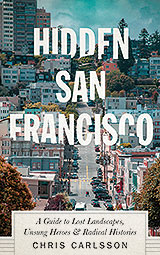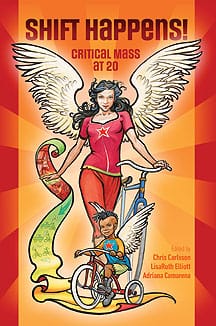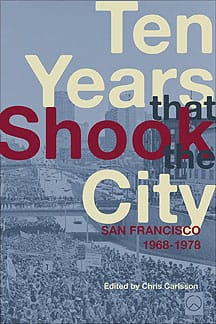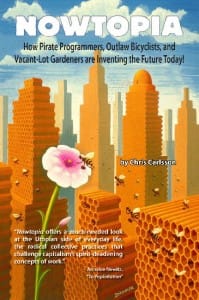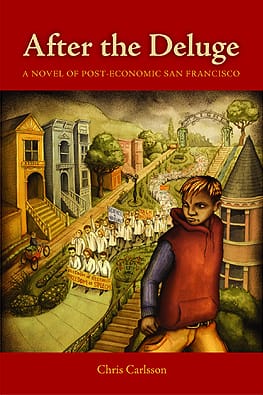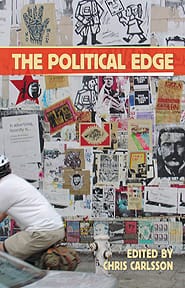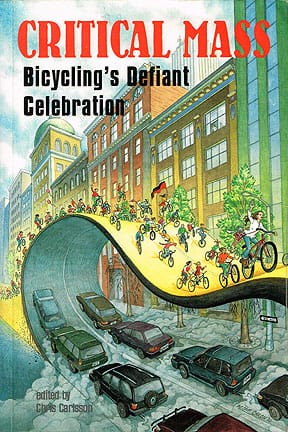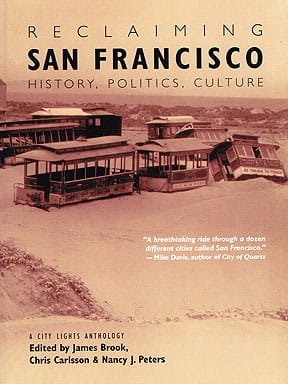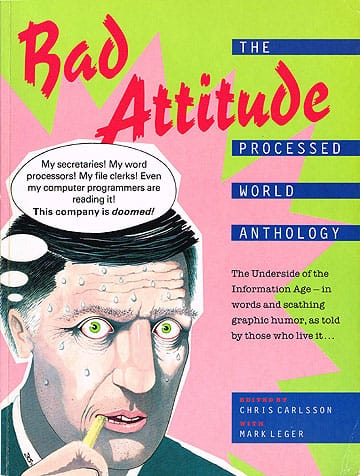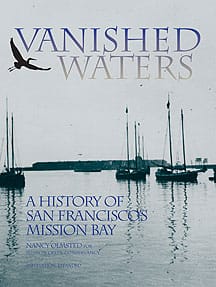Recent Posts
-
And Yet, We Go On
April 22, 2024
-
It IS Happening Here
February 16, 2024
-
General Ludd to General Intellect
January 11, 2024
-
Temporal and Geographic Edges
December 26, 2023
-
The Root of All Evil
October 13, 2023
-
Post-Pandemic Melancholia . . . Same As It Ever Was?
September 3, 2023
-
Chronicle of Deaths Foretold
June 24, 2023
-
Reparations is the Least We Should Do
May 11, 2023
-
We Are Not Alone
April 9, 2023
-
War and Anti-War
February 22, 2023
|
New Orleans and Katrina has been an amazing story. I got up early the morning it hit expecting to see NO having been wiped out and as we know it seemed to have survived in those first hours… But from then on it’s been a nonstop horror show. Other bloggers and journalists have written about this far more eloquently and with much more knowledge than I. Here are some really worthwhile pieces, things I’d call “must-read”: Tom Englehardt, Billmon (actually Billmon has been on a tear, and I heartily recommend reading through all his entries since Sept. 1. The ones that were posted after the one I just linked to are just as good), Jordan Flaherty (who continues to add more fantastic reports from the ground).
The obvious denunciations of long-term, systemic governmental malfeasance are covered in these pieces. The sensationalist news coverage at the expense of the African-American poor whose lives have been wrecked has been an ongoing shame. This morning on Democracy Now! first-hand accounts of average folks taking care of each other and doing the rescuing and real work finally started coming out.
I expect these stories of ordinary heroism and human grit to surface more and more in the days to come. The basic realities of mutual aid and cooperation vs. militarized governmental incompetence and brutality may actually resound. I’ve been wondering for several years what would be the “Chernobyl” for the Cheney regime and the U.S. gov’t. more generally. Maybe Katrina/New Orleans will be it, starting an inexorable process of unravelling and delegitimation that will really alter power relations in the world, perhaps even leading to the ultimate collapse of the U.S. empire. The nuclear accident in Chernobyl in 1985 pushed the Gorbachev reforms that finally brought down the Soviet Union (much more than anything Reagan did!); similarly, the 1985 or 86 earthquake in Mexico City also delegitimized an incompetent and ineffective PRI government, leading to the victory of Cardenas in the 1988 presidential election (stolen by massive PRI fraud), but again starting a longer term process that the Zapatistas pushed further when they emerged, that ultimately brought down the one-party state in Mexico.
Has the one-party state in the U.S. finally suffered a fatal blow (even if it takes months and years to fully reveal its mortality)? Let’s hope.

I found this on a telephone pole at 25th and Hoffman as I was riding up Twin Peaks yesterday. Bush has practically no support around here, not even in the rich uphill neighborhoods in SF…
I woke up yesterday and did the unthinkable: I started reading a poetry book! The hook for me is that it’s a collection of San Francisco-related poetry edited by devorah major, whom I think is one of the best writers of our era, and just dang smart. It’s an awesome collection (The Other Side of the Postcard) and it didn’t take long before my heart was aching and my head spinning. The poem that just grabbed me by the throat and hasn’t left me yet is called “Dojo” by Thomas Centolella. Here’s an excerpt:
what gets me going again
is the lamentable
high school where I taught
a shy fifteen-year-old
the uses of metaphor, the magic
of calling one thing
by another’s name,
…
a high school where mine
was the only light face
in a too full room of dark faces,
though I had my own darkness
and kept it to myself,
though they had their own light
and spent it freely, their hands
shooting high at every question,
bodies almost airborne, loud
entreaties for me to call on them,
to let them show off
how much they knew,
how worthy they were
of a hundred attentive ears–
a school that displays on the outside
a visionary’s name
and on the inside: a metal detector,
…
The Impossible Job? The public school teacher, of course. Who could give what is called for, when dozens of yearning hearts and minds clamor for recognition, respect, love and dignity? When the airless, gray, somber poverty of decrepit schools says to all inside that they don’t count, that there is only a dull, stupid future ahead to match the witless repetition of the school’s mission to get everyone ready for a test so they won’t be “left behind”?…
They work every day under the crushing weight of the hated and the hateful, trying to spark beauty and creativity from the cracks and fissures of a predetermined stupefaction that is reduced to accepting survival as a satisfactory target. What an impossible task, to bring one’s own humanity and vulnerability to the daily grind of processing young damaged humans, looking for the glimmer of life and refusal and passion that burns in each of them, but so rarely flares into the open in the predictable and foul atmosphere that has beaten down so many spirits before this moment.
Continue reading The Impossible Job
For some weird reason I keep reading books side by side that I don’t imagine will have anything to do with each other directly, but then they turn out to be remarkably connected. I suppose it’s just my brain that’s making the connections, but thematically I keep getting surprised in fascinating and charming ways. The latest serendipitous duo is Jonathan Schell’s The Unconquerable World (Holt, New York: 2003) and Gus Les’s novel China Boy (Penguin, New York: 1991). China Boy is the book currently recommended by San Francisco’s librarians as a citywide reading project. They have chosen well. It’s a crisp, fascinating story that takes us inside the immigrant child’s experience and also inside a rather different time in San Francisco and U.S. history (the 1950s). Schell’s book, which I mentioned already in an earlier post, is subtitled “Power, Nonviolence, and the Will of the People” and is more than anything else a history of the evolution of social power from coercive to cooperative.
The odd juxtaposition of these two books revolves around violence. In Schell’s long look at the rise of the war system, its relative demise through nuclearization and mutual terror, and the emergence of popular will or cooperative power from below, he makes a compelling argument about how ineffective violence is. Not just in terms of wrecking lives and the planet, but following Hannah Arendt and Gandhi and even Trotsky in a small way, he illustrates how violent coercion fails to get the goods, how it cannot get “its” way, that winning hearts and minds and willing cooperation is still the crux of the matter. Violent force is simply incapable of establishing long-term control. Obviously it can “win” briefly (and brutally) but over time human dignity asserts itself, even something like “truth” (a complicated abstraction these days) itself erodes the ability of madmen and tyrants to dominate.
Another way to see this is in terms of patriarchal authority. Being a dad I had a lot of years to contemplate the relationship between inspiration and coercion. I also benefited from my own father’s very liberal and nonviolent approach to reason and authority. I, in turn, could never see much point to being heavy-handed and dictatorial in my parenting life, any more than I can in the rest of life. I’ve thought since Bush came in that that crowd’s whole approach to the world is that of a stern father. If you don’t do as I say I will punish you. If you continue to disobey I will hit you harder and increase your punishment”¦. and so on, ad infinitum. Obviously it doesn’t work. Various analysts who compared Bush and Kerry in terms of fathering styles made analogous observations, that people who believed in a stern, punishing father supported Bush and those who believed in a consultative, liberal and open-minded model of fathering went for Kerry (Kerry’s hopeless inadequacy notwithstanding). The wars in Iraq and Afghanistan seem to be driven by this mindset of the angry father, trying to enforce his rules through violence. Hopeless, but it sure does kill and maim a lot of folks until people finally stop it.
The most resonant part of Schell’s analysis for me is the part of the book where he describes the 1989 revolutions and the rather sudden and relatively nonviolent disappearance of the Soviet Union. Earlier in the book he spends an entire chapter on Gandhi, which taught me a lot about the specific historic evolution of Gandhi’s merging of politics and religion, showing how that poisonous relationship has its roots in a more progressive effort. In examining the Eastern European revolts that ultimately brought down the Soviet Union (the U.S. benefited from the end of the Cold War and claims it as a great victory, but Schell’s analysis throws a much needed corrective light on this period of history) Schell takes the time to quote the secular writings of Jacek Kuron and Vaclav Havel. In particular, Havel and others around the Czech movement known as Charter 77 theorized that in the face of the preponderant power of the Soviet Union the task was to develop power by founding new associations and organizations, to found “parallel structures”. Havel predicted that these would arise first in the realm of culture, where a “second culture” might develop (Havel was in turn quoting Czech writer Vaclav Benda and rock musician Ivan Jirous). To some extent, I believe this is what a lot of us are doing these days. My next book will make this argument, among others.
By contrast, Gus Lee’s protagonist, Kai Ting, a scrawny 7 year old boy whose family escaped China at the end of WWII and ends up on McAllister near Masonic north of the Panhandle, discovers a San Francisco street life for boys that is extremely violent and intimidating. When his mother dies prematurely and his father remarries an American, the new stepmom turns out to be as violent and heartless as the streets she forces Kai (“China Boy” as he’s known) to stay in every day until dinner, regardless of what happens to him. It’s a heartbreaking story at many points, but is also a saga of incredible humanity and resilience, memory and cultural continuity, and finally a quintessentially American melting pot story. Instead of being in New York though, it’s right here in San Francisco in the 1950s, when the area around the Panhandle is nearly 100% African-American, the Korean War is killing lots of locals, and the old housing stock is completely dilapidated and impoverished. The fear and confusion of a small boy who can barely see or speak the language is eloquently captured, placing us in his narrow, frightened shoes. Local bullies beat him up with alarming regularity; when he gets home his new stepmom is not only not sympathetic but spends an inordinate amount of time punishing him and his sister for “transgressions” that are merely their normal behavior as Chinese youth.
The solution for Kai begins to take shape when his ex-Koumintang General father enrolls him in a boxing program for kids at the Central YMCA on Golden Gate and Leavenworth. His universe slowly begins to expand, and the warmth and care shown him by his boxing teachers gives him a safe haven from his heartless and deculturated home life. The story follows his long resistance to developing self confidence and physical skills, but the book climaxes with Kai taking on a huge schoolyard bully and prevailing in a bloody brawl. The epic battle is framed as his way out of being bullied for the rest of his life, and on the very last line of the book he asserts his newfound independence from the violence of his stepmother too. The ultimate underdog story, and a resonant American tale of standing up to bullies and developing self-defense skills, in this case via boxing, to stop violence with violence. His choice, largely imposed by the world around him, to learn how to fight, is contrasted to his remaining elderly Chinese uncle’s advice to turn away from the physical world and to use his brains to escape the terrain of violent confrontation. But there’s no escape except to stand up and fight, more or less the story that Americans learn from the skewed history we’re given as we grow up. Taking place in the 1950s, with WWII still a very fresh memory, it’s not hard to see why this story is so resonant.
But the message is precisely the opposite of Schell’s eloquent, cerebral repudiation of violence. Schell’s book sports endorsements from such mainstream politicos as Harrison Salisbury and Strobe Talbot. He cannot be placed in a radical context on his own merits, especially since so much of his motivation seems to be advising governments and policy makers on how to manage a complicated transition away from the imperial project currently unfolding. But his historical analysis is a vital contribution to bolstering our radical desires to remake life from below, to making plausible our vision of revolution.
“A revolution against violence in the world at large today would not be the realization of any single plan drawn up by any one person or council but would develop, like open software, as the common creation of any and all comers, acting at every political level, within as well as outside government, on the basis of common principles.” (p. 349)
As much as I was beaten up in my childhood, these two books swirl around in my head and bring up all kinds of memories and ideas. Not conclusive in either case, but together they brilliantly frame two opposite but complementary ways of confronting a world gone mad.
|
|



